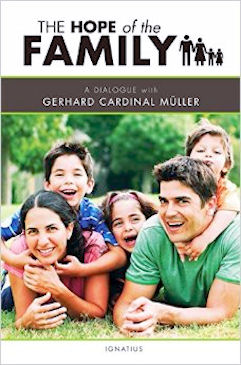
|
Posted November 20, 2014
Book: The Hope of the Family: A Dialogue with Gerhard Cardinal Muller Edited by Carlos Grandos Ignatius Press. San Francisco, CA. 2014. Pp. 86 An Excerpt from the Jacket:
The main problem with the family in the Church today, contends Gerhard Cardinal Muller, is not the small number of civilly remarried divorced Catholics who want to receive Holy Communion. It is the large number of Catholics who live together before marriage, who marry civilly, or who do not even bother with marriage, as if these choices were sound options for Catholic living. Furthering the problem is the widespread failure of married Catholics to understand marriage as a way of Christian discipleship. In this engaging conversation, Cardinal Muller, one of Pope Francis' top advisers in the Vatican, addresses the challenges facing marriage and family life today. The loss of faith in many traditionally Christian societies has led to a crisis. In turn, cohabitation, civil marriage, an divorce and civil remarriage, further undermine faith because they harm the family as the "domestic Church" and the place of initial evangelization. Thus, the Church must undertake a robust new evangelization of the family: sharing the fullness of truth about marriage and family in Christ, encouraging families to worship and to pray together, and helping them to witness by their lives the joy of the gospel. Cardinal Muller stresses mercy and compassion in pastoral ministry with struggling Catholics, but he does so without either contradicting the teaching of Jesus about divorce and remarriage or minimizing the power of grace to transform lives. In this way he proclaims hope for the family rooted in the gospel of Jesus Christ. An Excerpt from the Book: Question: Saint John Paul II was a true friend of young families. During his entire priestly life, he assisted many couples in their first years of marriage. Today the problem arises of how to help these families. We know that most divorces and family breakdowns occur in the first five years of marriage. It is the period in which the couple faces the task of raising their first child (or, sometimes, tries unsuccessfully to do so) and many crises and difficulties arise with their respective families, a time when many difficulties in living together come to light. How does the Church make herself present in those first years? How can the Church's doctrine sustain the hope of these marriages? Cardinal Muller: We have to go back to insisting on catechesis before marriage. Many times we detect the false ideas that we have just expounded in those young couples who come to our parishes to be married. It impresses me to see them so filled with high hopes and convinced of the depth of their love; and I am saddened that later on a large percentage of them will eventually break up irremediably. No one has given them emotional formation in what marriage means, both as a natural reality and as a grace. They do not realize that this secularized, materialistic, and hedonistic society has insistently told them in all the media and in every way that marriage is merely egotism for two, mutual selfishness. As a pastor, I tell myself: This cannot be! Someone will have to present the truth to them! Someone will have to open their eyes and tell them that they have been cruelly deceived by a false anthropology that leads only to disaster! On the other hand, though, how are we to do this? Surely, regardless of what pastoral means we employ, we must first of all keep very clearly in mind the fact that the solution is precisely to point out the false understanding of the human being --- of his origin, end, and objectives --- that they take as their starting point. The means that we use to do this will depend on the specific case, but above all we will have to speak to them about the authentic love and the concrete plan that Christ has for them. Considering again the relation that exists between doctrine and life I would say that the remedy for this situation is in living doctrine. "What is man?" we must ask continually. We have to be very careful, because all sorts of disasters follow from a false definition of man and of his destiny, from an apparently "doctrinal" question. If we give a false definition of man, there are terrible consequences. If we obscure the fact that man must define himself in his relationship with God, the origin and end of the person, the result is absolute immanentism: a dead end in which man sees himself obliged to perfect himself by created means alone, among which sexuality appears as an idol. On the other hand, if contemporary man learns anew to see his life in the light of grace, he will be capable of rediscovering the supernatural vocation that gives meaning to the whole person: he will realize that he was created for something higher, for an infinite destiny and that the means for reaching that goal matter. Table of Contents: Preface The Introduction The Hope of the Family |
|
